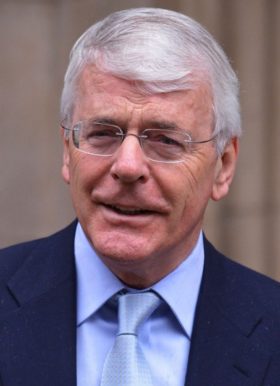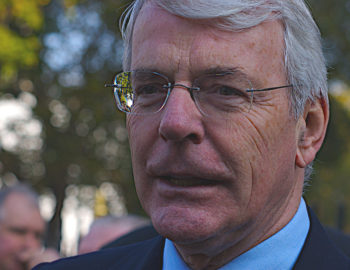
John Major
The Right Honorable Sir John Major, former prime minister of Great Britain and Northern Ireland and a leading authority on the changing global landscape, was selected to give the 145th Commencement address at Washington University in St. Louis in 2006.
Major’s talk is titled “The Changing World.”
“We are fortunate to have an international leader as this year’s Commencement speaker,” Wrighton said. “Sir John led one of the world’s great countries, and he has an extremely important perspective on international issues. I am just delighted that he has accepted our invitation to speak this year at our most important academic event.”
Commencement marked Major’s second visit to campus. On April 20, 2005, he was a keynote speaker at an Olin School of Business conference exploring the international business environment.
Major was appointed prime minister on Nov. 28, 1990, and re-elected when the Conservative Party won an unprecedented fourth term in office at the general election of April 1992.
Major was born in 1943 and grew up in Brixton, south London. He attended the Rutlish Grammar School but left at 16 to help support his family. He had a variety of jobs before joining Standard Chartered Bank (1965-1979), rising to the rank of bank executive.
Major became interested in politics as a teen, joining the Young Conservatives, and in 1968, won his first election to a local authority, the Lambeth Borough Council. He stood for the British Parliament twice in the 1970s, before securing election to Parliament for Huntingdon in 1979.
In Parliament, Major served in the government for 16 years, 10 of which were in the Cabinet. Commenting on his rapid rise through the ranks to prime minister, Major noted that he had only once done a government job for more than a year: he was chief secretary to the treasury from 1987-89.
His one-year positions were junior whip in 1983; senior whip in 1984; parliamentary secretary 1985; and minister of state for social security and the disabled 1986.
In July 1989, he was appointed secretary of state for Foreign and Commonwealth Affairs, a position he held for 94 days before being appointed chancellor of the Exchequer in October that same year.
Upon becoming prime minister in 1990, Major followed in the footsteps of Margaret Thatcher and the legacy of her government. He moved into 10 Downing Street facing a weakened party, disagreements over Europe, economic recession, violence in Northern Ireland and the likelihood of war in the Persian Gulf.
Continuing the United Kingdom’s strong ties with the United States, Major gave full support to the United States in the Gulf War of 1991, and thereafter to the U.S. position on Iraq in the United Nations. The British commitment to the Gulf War was second in size only to the United States.
Major’s seven years as prime minister were not easy ones. Unlike Thatcher, his party only had slim parliamentary majorities. Nevertheless, on May 1, 1997, he handed over one of the strongest economies any incoming government had inherited, with The Daily Telegraph in London observing that “John Major leaves a richer legacy than any of his predecessors.”
While prime minister, he also instituted public-sector reforms that became international models, and he initiated an unprecedented effort to secure lasting peace in Northern Ireland.
Working for peace
 Since leaving office, Major continues working to secure peace in Northern Ireland, lending his support to Prime Minister Tony Blair. On New Year’s Day 1999, Major was awarded The Companion of Honour, bestowed on him by Queen Elizabeth in recognition of his initiation of the Northern Ireland Peace Process.
Since leaving office, Major continues working to secure peace in Northern Ireland, lending his support to Prime Minister Tony Blair. On New Year’s Day 1999, Major was awarded The Companion of Honour, bestowed on him by Queen Elizabeth in recognition of his initiation of the Northern Ireland Peace Process.
He discusses his leadership triumphs and defeats in “John Major: The Autobiography,” published in 1999. Major stepped down as a member of Parliament when the British general election was called in May 2001.
His business interests today include serving as senior adviser to Credit Suisse and chairman of the European Advisory Council of Emerson. He is chairman of the council of the Ditchley Foundation and a member of the international advisory board of The Peres Center for Peace in Israel. He is also a patron of the Atlantic Partnership.
His charitable interests include the presidency of Asthma UK and patron of the Prostate Cancer Charity, Wavemakers (formerly Child of Achievement Awards), Mercy Ships and Support for Africa. He also takes an active interest in the work of the Royal National Institute of the Blind, the National Society for the Protection of Cruelty to Children and the Consortium for Street Children.
Major was president of the Surrey County Cricket Club at The Oval — where his lifetime passion for cricket was born — in London from 2000-02.
On St. George’s Day, April 23, 2005, the Queen appointed Major a Knight Companion of the Most Noble Order of the Garter. This is an historic honor dating from 1348 and remains solely the personal gift of the monarch.
Major has been married to Dame Norma Major since 1970 (she was made a dame of the British Empire by Queen Elizabeth in June 1999). They have two children, Elizabeth and James, and one grandson, born in July 2000.